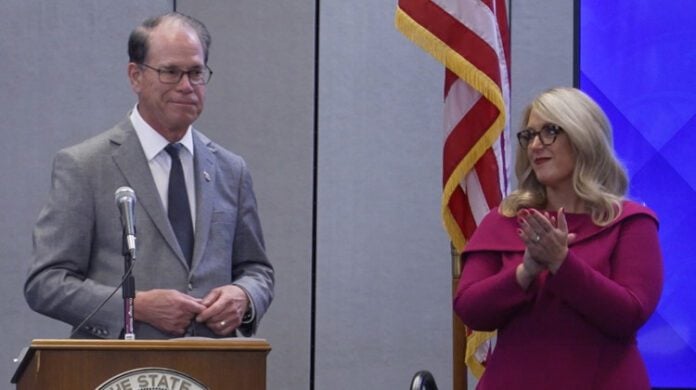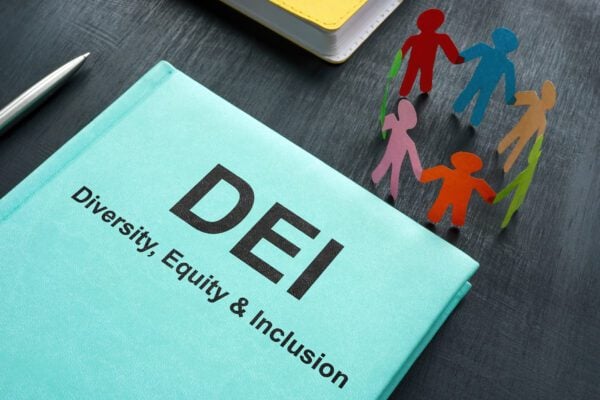
This story was originally posted on WFYI.
By Eric Weddle
In a sweeping policy shift, Indiana state agencies have ended funding for multiple education initiatives and scrubbed dozens of materials that referenced diversity, equity, or inclusion — part of a directive from Gov. Mike Braun to eliminate what his administration calls divisive ideology.
The changes affect both K-12 schools and public universities, with impacts on students, teachers, and college outreach efforts.
The executive order, issued earlier this year, required agencies to eliminate all initiatives labeled “diversity, equity, and inclusion,” or DEI, which the administration described as incompatible with “merit, excellence, and innovation.” State reports show that 70 DEI-related trainings, instructional efforts, or programs have been removed so far.
“Indiana has replaced the divisive, politically charged DEI ideology with Merit, Excellence, and Innovation: a level playing field where every single Hoosier has the chance to get ahead with hard work,” Braun said in a statement.
The executive order touched nearly every corner of the state’s education system. In K-12 schools, the Indiana Department of Education conducted a wide-ranging audit to remove references to equity and inclusion from state academic standards, instructional materials, grant applications and websites. In higher education, a grant program overseen by the Indiana Commission for Higher Education that targeted first-generation students, students of color and others from underrepresented backgrounds was not renewed.
The Indiana School for the Blind and Visually Impaired and the Indiana School for the Deaf — which are both state run — were required to strip DEI-related language from their handbooks and policy documents.
Programs changed, phased out
Among the most visible cuts is the Padres Estrellas initiative, which embedded Spanish-speaking outreach workers in schools and neighborhoods to help Latino families enroll in the state’s 21st Century Scholars program — a college scholarship for low-income students. The Commission for Higher Education ended the program last month.
In 2023, CHE Commissioner Chris Lowery described the state’s low college-going rate for Hispanic and other students of color as “unacceptable” and “an emergency.”
The programs and materials now being phased out are detailed in a 444-page document released by Braun’s office. It includes:
Higher education:
- A STEM teacher recruitment grant used to fund a Black teacher residency program to support schools with teacher shortages in underserved areas will expire in August and will not be renewed. “Instead, that funding may now be directed to an organization that will support STEM teachers based on their merit and not their race,” according to an executive summary of statewide changes.
- The College Success Program that funded coaches to support “first-generation students of color” at Purdue Northwest, Indiana State University and Valparaiso University will not continue into 2026.
- The Department of Education will take over the Career Coaching Grant program to ensure future funding aligns with the executive order. The current grants — including one described as “tailored to support minority and low-income students” — will end in December as originally scheduled.
- The state’s College Equity Reports on student preparedness and success by race and ethnicity, socioeconomic status and gender were removed from the CHE website.
K-12 education:
- Videos on the state online Learning Lab — which are meant for families, teachers and administrators — were removed if they included phrases like “to support diverse learners in inclusive classrooms” or referenced “the essential role of equity and inclusion in the new science standards.” Additional removals are ongoing, according to the report.
- Academic standards tied to ethnic studies, certain social studies topics and employability skills are undergoing formal review to eliminate language deemed inconsistent with the executive order.
- A state-issued guide for applying to the High Ability Program grant was revised to remove references to “equity and access” and “underrepresented populations.”
- The state’s application for a federal charter school grant program will no longer include the phrase “diverse and equitable learning opportunities.”

An Indiana Department of Education spokesperson, in response to questions from WFYI, said the department will continue to “elevate the importance of improving outcomes for all K-12 students.”
“This means ensuring each student has access to supports based on their unique learning needs,” Courtney Bearsch said in an email.
Advocates of these programs worry their removal disproportionately harms students already facing systemic barriers. In Marion County, for example, less than 56% of Hispanic students read at grade level by third grade — a key predictor of later academic achievement.
Mark Russell of the Indianapolis Urban League said Braun is now taking a stance that Indiana will “treat everybody the same regardless of their standing or circumstances.”
Russell worries these new policies, coupled with the Trump administration’s overhaul of the U.S. Education Department, creates an environment where students who would benefit from additional support, will be left behind.
“It cannot be denied that these steps that have been taken at both the federal and the state level are detrimental to the interest and well-being of at-risk students of all races, stripes, and creeds,” Russell said.
Redacting equity from classroom policy
The Department of Education’s purge of DEI references extended beyond K-12 standards, which outline what Indiana students are expected to learn. The department changed grant conditions and pressured national partners to remove DEI language from strategic plans if they wanted to keep working with the state.
A vendor that provides student assessments for the state, Smarter Balanced, removed a DEI page from its website at the department’s request, according to the report. In other cases, national accreditation bodies and technology organizations altered planning documents after being contacted by the department.
And even a letter from Secretary of Education Katie Jenner to local school leaders was flagged. A draft version of the Teacher of the Year nomination letter, circulated earlier this year, described an ideal candidate as someone who fosters “a school culture of equity and success.”
David Marcotte, executive director of the Indiana Urban Schools Association, said the principles behind DEI are long-standing practices of good teaching, such as understanding students’ backgrounds and helping all feel valued. He said educators will follow the state’s new rules.
“However, making sure all students feel valued and comfortable each day, regardless of background, will continue to be a goal,” Marcotte said. “It’s called good teaching.”
All of these changes come as Indiana schools are becoming more diverse. The number of students learning English in Indiana nearly doubled since 2012 to just more than 9%. In Marion County, English language learners make up nearly a quarter of all students at public schools.
Eric Weddle is WFYI’s education team editor. Contact Eric at eweddle@wfyi.org or follow him on X at @ericweddle.
Editor’s note: A previous version of this story incorrectly stated that the Career Coaching Grant program was tailored to support minority and low-income students. Only one grantee used their grant for that purpose.




